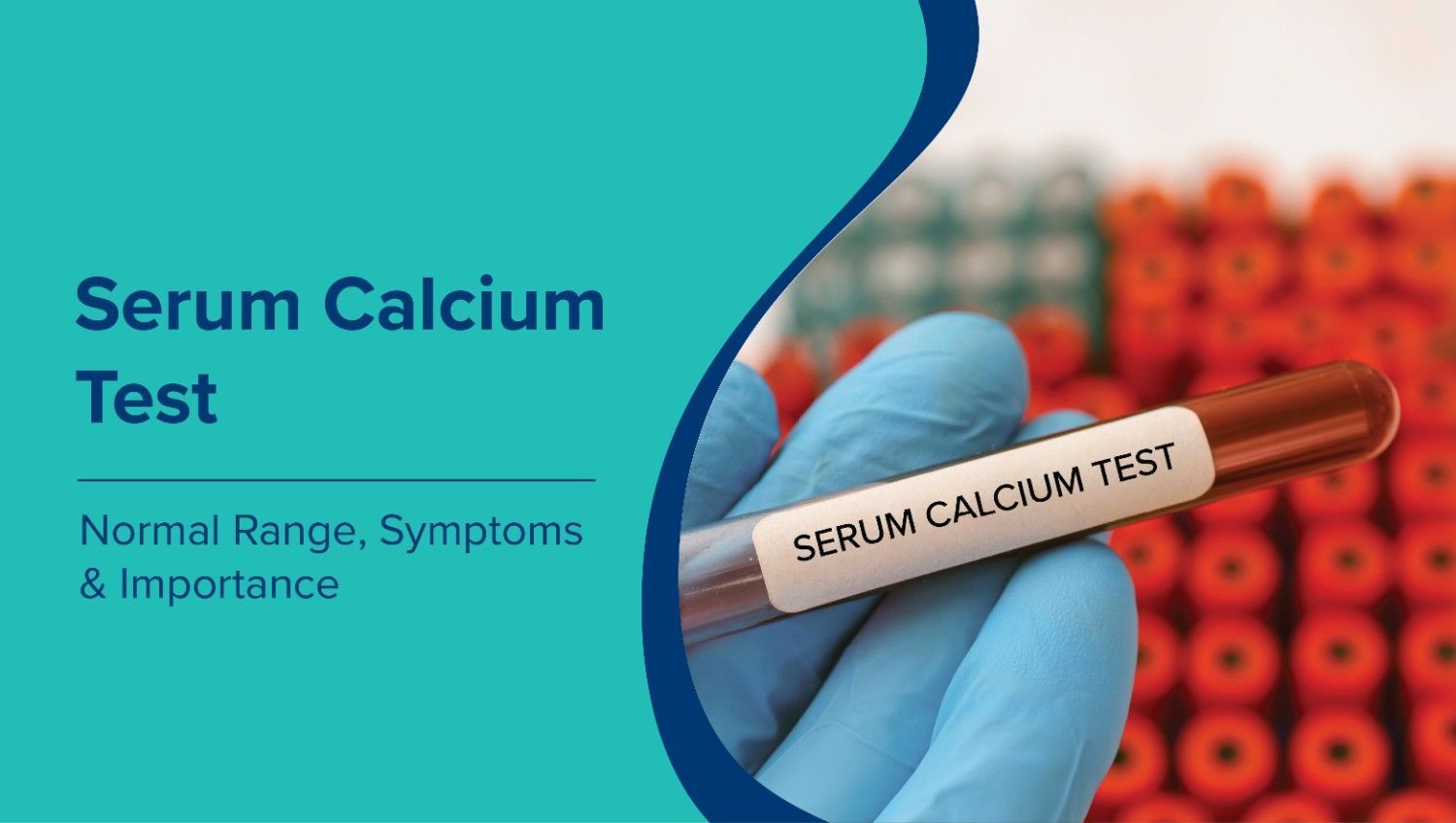Chikungunya is a mosquito-borne viral illness that continues to affect thousands of people across India each year. With unpredictable weather patterns and off-season rains becoming more common, mosquito activity is no longer limited to the monsoon, which means the risk of infection can now persist throughout the year. While rarely life-threatening, chikungunya can lead to debilitating symptoms that persist for weeks or even months, impacting daily life, highlighting the importance of early detection. Thankfully, with at-home lab services now available across India, Chikungunya virus diagnosis has become safer, faster, and more convenient than ever. That said, understanding its symptoms, how it's diagnosed, and the available treatment options is crucial for early intervention and effective recovery. In this guide, we break down the essentials of Chikungunya to help you stay informed and protected.
What is Chikungunya?
Chikungunya is caused by a virus that spreads through the bite of infected Aedes aegypti and Aedes albopictus mosquitoes. The virus belongs to the alphavirus genus and causes a sudden onset of fever and intense joint pain. Though not usually life-threatening, the infection can be extremely painful and may lead to lingering joint stiffness, especially in older adults.
Chikungunya outbreaks are common in India during and after the rainy season, when mosquito breeding increases. The incubation period is typically 2 to 7 days, after which chikungunya virus symptoms appear abruptly.
Symptoms of Chikungunya Virus
The symptoms of chikungunya usually begin suddenly and can be intense in the first few days. While most people recover completely, some may experience lingering joint discomfort for weeks or even months.
Common chikungunya virus symptoms include:
- High fever (often over 102°F or 39°C)
- Severe joint pain, especially in the wrists, ankles, knees, and fingers
- Headache and muscle pain
- Skin rash, usually appearing after the fever subsides
- Fatigue and weakness
- Swelling in the joints
Symptoms typically last for 5–7 days, but joint pain may persist much longer in some individuals.
Who Should Get Tested for Chikungunya?
Testing for chikungunya is recommended when symptoms suggest the infection, especially during peak mosquito seasons or in outbreak-prone areas. Since chikungunya shares symptoms with other illnesses such as dengue or viral fever, laboratory testing is the only way to confirm the diagnosis.
Testing may be advised for:
- Individuals with sudden high fever and joint pain
- People living in or returning from mosquito-infested regions
- Cases where dengue, COVID-19, or other febrile illnesses have been ruled out
- Individuals experiencing persistent joint pain after a recent fever
- Those with known community-level transmission or outbreak exposure
Chikungunya Virus Diagnosis
Accurate Chikungunya Virus Diagnosis is essential because its symptoms often resemble other illnesses such as dengue or viral fever. Laboratory confirmation helps ensure timely care and the right chikungunya treatment plan. The chikungunya fever test is typically recommended when a person develops sudden high fever with severe joint pain, especially in mosquito-prone or outbreak areas. Testing is also crucial for individuals experiencing lingering joint discomfort after a recent fever. Without proper diagnosis, chikungunya can be easily mistaken for other infections, delaying treatment and recovery.
Types of Chikungunya Tests
Several blood tests for chikungunya virus are available to confirm infection. The choice of chikungunya diagnostic test depends on how long it has been since chikungunya virus symptoms began:
Common diagnostic tests include:
- RT-PCR Test: Detects the chikungunya virus’s genetic material in the blood. This test is most accurate during the first 7 days of illness when the virus is still present in the bloodstream.
- IgM and IgG Antibody Tests (ELISA method): These tests identify antibodies produced by the immune system in response to infection. IgM antibodies appear about 4–5 days after symptoms begin and may remain for several weeks. IgG appears later and may persist for years.
How to Prepare for a Chikungunya Fever Test
Preparing for a chikungunya fever test is simple and requires minimal effort:
- Fasting is not required, and the test can be done at any time of day
- Inform the phlebotomist if any medications or antipyretics (fever reducers) have been taken
- It’s best to schedule the test while fever or joint pain is active for better accuracy
- Stay hydrated, especially if symptoms include vomiting or weakness
Understanding Results from Blood Tests for Chikungunya Virus
Results from blood tests for chikungunya virus help confirm whether a person is currently infected or has had a past infection. The type of test, RT-PCR or antibody, determines how results are interpreted.
- RT-PCR Positive: Indicates active chikungunya infection, especially if done within the first week of symptoms.
- IgM Positive: Suggests a recent infection. The presence of IgM antibodies typically confirms that the illness occurred within the past few weeks.
- IgG Positive (with or without IgM): May indicate a past infection or late-stage immune response.
- Negative Result: May mean no infection, or it may be too early or too late in the course of illness for the test to detect the virus or antibodies.
Chikungunya Treatment: How to Ease Symptoms and Heal Naturally
Chikungunya has no targeted antiviral cure, so treatment is aimed at easing symptoms and helping the body recover naturally. Most individuals recover fully within a week, though joint pain can last longer in some cases.
Recommended chikungunya treatment includes:
- Paracetamol (acetaminophen) for fever and pain relief
- Adequate rest to allow the body to heal
- Hydration with water, oral rehydration solutions, or fluids with electrolytes
- Nutritious diet to support immune recovery
Note: Medications like ibuprofen and other NSAIDs should not be used unless dengue has been excluded, as they may raise the risk of bleeding in dengue cases.
For lingering joint pain, mild anti-inflammatory medications or physiotherapy may be recommended by a doctor.
How Long Does Recovery Take?
Most people begin to feel better within a week of symptom onset, especially if they receive early care and rest. However, the duration of recovery can vary depending on age, immune status, and existing health conditions.
Typical recovery stages:
- Fever and rash usually resolve in 5–7 days
- Joint pain and stiffness may continue for several weeks
- In some individuals, particularly older adults or those with pre-existing joint issues, joint discomfort can persist for months
When to See a Doctor
While many cases of chikungunya resolve on their own, certain symptoms may indicate complications or the need for medical intervention. Seeking timely medical care can help prevent worsening of symptoms and ensure proper management.
Consult a doctor in the following scenarios:
- Fever lasts more than 5 days
- Severe or worsening joint pain
- Signs of dehydration, such as reduced urination or extreme fatigue
- Bleeding, bruising, or low platelet count concerns
- Persistent swelling or stiffness in the joints
- Increased risk due to age, pregnancy, or pre-existing conditions
Medical advice is especially important if the illness does not improve with home care or if other infections (such as dengue or malaria) are suspected.
Preventing Chikungunya Infection
There is currently no vaccine to prevent chikungunya, so the best defence is avoiding mosquito bites and reducing mosquito breeding around the home and community.
Effective prevention tips include:
- Use mosquito repellents on exposed skin, especially during the daytime
- Wear full-sleeved clothing and trousers to reduce skin exposure
- Install window screens and use mosquito nets, particularly in sleeping areas
- Empty or cover water containers at home to prevent mosquito breeding
- Avoid visiting mosquito-prone areas during outbreaks, if possible
How MaxAtHome Can Help
MaxAtHome offers a convenient and reliable way to test for chikungunya fever from the comfort of home. With professionally trained phlebotomists and NABL-accredited labs, the entire process is designed to ensure safety, accuracy, and timely results.
MaxAtHome provides:
- At-home chikungunya fever test with safe sample collection
- RT-PCR and antibody testing options based on the stage of illness
- Quick turnaround time for test reports
- Digital access to chikungunya blood reports via email or WhatsApp
- Transparent pricing with no hidden charges
With MaxAtHome, individuals can access quality healthcare without the need to visit a clinic or hospital, especially during illness. To book a chikungunya test at home, call 09240299624 or schedule the test online through our easy-to-use booking platform.
Chikungunya Test Price
The cost of a chikungunya test can vary depending on factors such as the type of test (RT-PCR or antibody), the city where it is booked, and whether home collection is included. Rapid antigen tests may cost slightly less, while more sensitive tests like RT-PCR may be priced higher.
With MaxAtHome, you get:
- Affordable pricing for both chikungunya RT-PCR and antibody tests
- No hidden charges or surprise fees
- Transparent rates that include home sample collection
- Easy access to digital reports
Pricing remains accessible for individuals and families looking for accurate chikungunya diagnosis from the comfort of home.
Frequently Asked Questions
What are the chikungunya virus symptoms to watch for?
Chikungunya virus symptoms typically include sudden high fever, severe joint pain, headache, fatigue, muscle aches, and rash. The pain may be intense and last for weeks in some cases.
What is the chikungunya diagnostic test?
A chikungunya diagnostic test is a laboratory-based examination, such as RT-PCR or IgM/IgG antibody testing, used to confirm infection. It helps differentiate chikungunya from other illnesses with similar symptoms and guides timely treatment.
What is the chikungunya test used for?
The chikungunya test is a blood test used to confirm whether a person is infected with the chikungunya virus. It helps differentiate chikungunya from other illnesses with similar symptoms, such as dengue or viral fever.
How is chikungunya diagnosed in a lab?
Laboratory diagnosis of chikungunya includes RT-PCR to detect viral RNA in early stages, and IgM/IgG antibody tests (ELISA) to detect immune response in later stages.
What does a chikungunya blood report usually include?
A chikungunya blood report will indicate whether viral markers (RNA or antibodies) are detected. IgM suggests recent infection, while IgG indicates past exposure. RT-PCR results show active infection.
How long does it take to get chikungunya test results?
Most chikungunya fever tests provide results within 24–48 hours, depending on the test type and laboratory capacity.
How can I reduce high pus cells in urine if chikungunya is suspected?
Chikungunya is not typically associated with pus cells in urine. If pus cells are present, it may point to a urinary tract infection or another underlying issue. A separate urine test and medical evaluation are advised.
Is testing for chikungunya possible at home?
Yes, chikungunya fever tests can be done at home through services like MaxAtHome, which offer safe sample collection and digital report delivery.
What are the blood tests for chikungunya virus?
The main blood tests for chikungunya virus include the RT-PCR test, which detects the virus in the early stage, and IgM/IgG antibody tests, which identify the body’s immune response. These tests help confirm whether the infection is current or recent and are essential for an accurate diagnosis.
Can chikungunya be completely cured?
There is no specific antiviral drug for chikungunya, but most people recover completely with rest, hydration, and symptom-focused care. Some may experience joint pain for weeks or months.
What is the usual chikungunya test price in India?
The price of a chikungunya test can vary depending on the type of test, location, and home collection fees. MaxAtHome offers affordable options with no hidden charges.
How can I book a chikungunya test near me?
You can book a chikungunya test near you through MaxAtHome’s home testing service. Simply call 09240299624 or use the online platform to schedule a home sample collection. Services are available across major cities including Delhi, Gurugram, Noida, Mumbai, and more.















